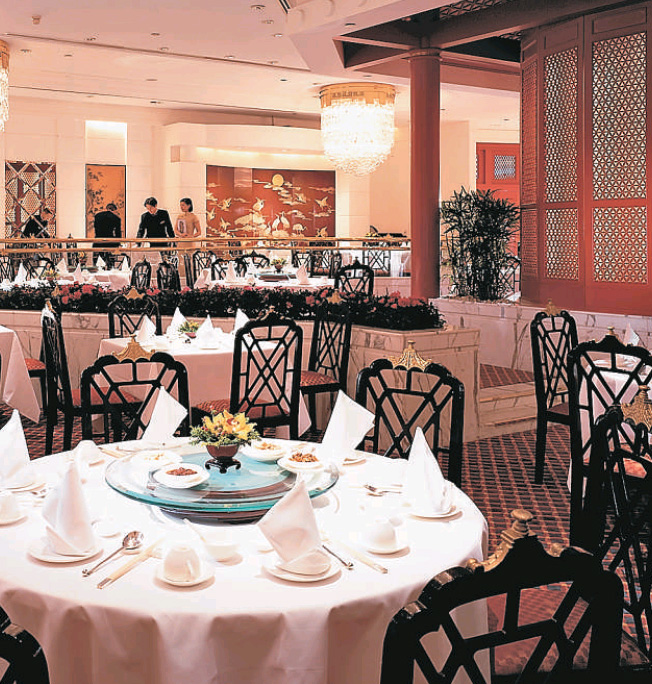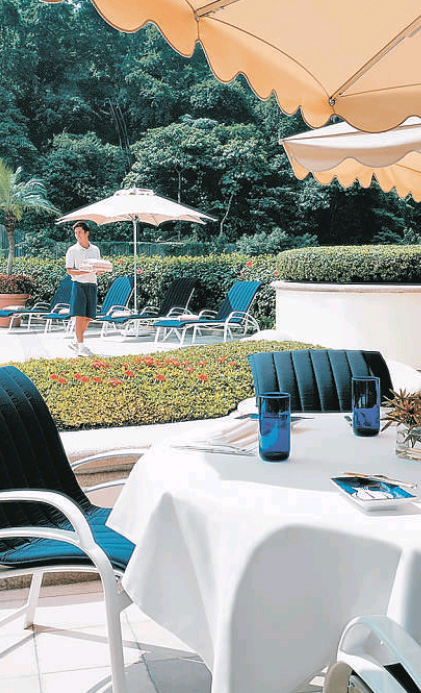Living beyond six-star service
Sun

There is nothing humble about the luxury hotel living concept as this photo of the island Shangri-La in Hong Kong illustrates. Living Shangri-La, Vancouver’s first luxury-hotel residency, will open in the fall, heading up a pricey series of similar developments.


The competition for the luxury-hotel household is fierce in Vancouver, with the Fairmont Pacific Rim, the Residences at Ritz Carlton and the Private Residences at Hotel Georgia all scheduled to open after Living Shangri-La. The Island Shangri-La building in Hong Kong and its lobby illustrate the competitive advantage the operator of the Living Shangri-La brings to the battle for prospect dollars.

The dining choices in the island Shangri-La in Hong Kong are many. Reports Claudia Kwan: ‘The stereotype of Chinese cuisine would have you believe it’s oil- and MSG- centric, but a thorough sampling of dishes reveals light and interesting combinations of flavours and textures, and unusual treats like delicately deep-fried ox brisket, duck tongue in abalone sauce and scallops with shrimp mousse in crab ‘coral’ sauce …’

With occupancy of the Living Shangri-La homes scheduled to begin in the fall, luxury-hotel residency is a Vancouver story awaiting a reporter. A trip to Hong Kong by Vancouver broadcaster and reporter Claudia Kwan, a young woman who also knows fine real estate and fine dining, put her front of queue for the task. Her report follows:
I drag myself off the plane feeling, and probably looking, like a slack-jawed zombie, wishing the man sitting next to me on the 14-hour flight between Vancouver and Hong Kong had kept his shoes on and had supplied everyone around him with earplugs.
After conking out in air-conditioned comfort on a shuttle to the hotel, I recover enough basic humanity to smile back at the doorman snappily opening the front door of the Island Shangri-La in the posh Central neighbourhood of Hong Kong.
The surrounding mall has some seriously high-end shopping, but all I can think of is a bed. Cheerful faces and greetings are everywhere as I’m ushered smoothly through the check-in process, having declined bellhop service for my battered backpack.
I had sent in a wish list in an e-mail before my arrival, and lo and behold, everything has been set up.
First is what ends up being a three-hour lunch at the Summer Palace, one of the five restaurants in the hotel. The stereotype of Chinese cuisine would have you believe it’s oil- and MSG-centric, but a thorough sampling of dishes reveals light and interesting combinations of flavours and textures, and unusual treats like delicately deep-fried ox brisket, duck tongue in abalone sauce and scallops with shrimp mousse in crab “coral” sauce (also known as the rich lining of a crab shell.)
On the morrow, I can have French, Japanese, or a swirl of other cosmopolitan cuisines as my whim dictates, or room service round the clock with one phone call. Through my stay, the very observant staff will try to anticipate every need I have before I know I have it. For example, they notice I leave a mango behind in the fruit basket (a little too messy for a klutz like me in a fancy hotel). The basket the following day doesn’t contain any. It’s both impressive and a little unsettling for someone who’s not used to being the object of so much attention.
After a nap, it’s off for an hour-long massage, where I’m told I have a lot of toxin build-up. Sorry about that. Then a long luxurious soak in the tub while watching television, and it’s off to sleep in a king-size bed under crisp cotton sheets.
This is the kind of six-star service that goes beyond being well taken care of. It could be termed no-brainer living, and it’s what people will begin experiencing in November shortly after moving into the Living Shangri-La development in Vancouver. The hotel is scheduled to go into full operation on Jan. 24, 2009.
The hotel chain was named after the paradise portrayed in James Hilton’s novel Lost Horizon, and peace, calm, and happiness are what they are striving to impart to guests, states Stephen Darling. The regional vice-president for Shangri-La Hotels and general manager knows there is stiff competition coming for luxury hotel living in the likes of the Fairmont Pacific Rim, the Residences at Ritz Carlton, and the Private Residences at Hotel Georgia, all scheduled to open within the next three years.
“Each hotel brand evokes a different feeling, and specializes in different services,” Darling writes in an e-mail. “I think of Shangri-La as a brand that builds on our Asian roots of fine service and hospitality. Asian hospitality is seen globally as perhaps the most thoughtful and gracious in the world today. It evokes both humble pride and a true sense of welcome. It will actually be the people — our staff — who set the Shangri-La experience apart from our competition.”
Which may prove to be true, but there’s nothing humble about the luxury hotel-living concept as a whole. Uber real estate marketer Bob Rennie (involved with selling all of the above projects except Hotel Georgia) says there’s a strong contingent of international buyers, but there’s also strong local representation from Vancouverites trading in addresses in Shaughnessy, on Point Grey Road, or Bellevue in West Vancouver.
What do they get? A signature address with “name-drop” factor on a world scale — not just a regional one — and security on a day-to-day basis and on their purchase as a whole, he says.
With doormen, concierges, housekeepers galore, “these could be considered the finest seniors’ homes on the planet,” Rennie declares. “If my mom lives at the Shangri-La, I know that there’s extra eyes watching her. I know if she’s having a bad day, she can order a cheeseburger.”
Others want a second home with no extra thinking required. Rennie says in addition to the convenience of having hotel staff and services just moments away, there are implied guarantees when one buys into such well-known brands.
Failed condominium projects have grabbed headlines recently in Vancouver, but he believes that will never be an issue in projects attached to such high-end hotels. “They will not allow their brand to be tampered with,” Rennie says adamantly.
The developers own the hotels themselves, while paying huge fees for management and brand association, so Rennie says they also have a vested interest in making sure the people who live above the hotel are happy.
That means the wireless television will work as planned, and the custom millwork won’t have any dings in it when it’s moved in. The limo service will be prompt, the spa staff pleasant, the gym equipment will never be out of order, and the pool will always be the right temperature.
In addition to the hefty property purchase prices themselves, there are hefty levies involved in living in luxury. Condo fees are likely 150 to 200 per cent of what you would pay for a similarly sized unit in a different building, confirms Rennie. (Residents will get a preferred rate on spa services at the Shangri-La, but if they run up a hefty tab at the restaurant, it’s entirely their responsibility.) Fees on that scale translate to entire mortgage payments for regular folks.
“This lifestyle is elitist, I can’t even couch that,” laughs Rennie. “When you look at people who want this, they’ve been paying that $500 and $700 a night for that luxury hotel brand for a night or a week. This way they never have to leave.”
I had a peek at paradise, and I was happy to return to normality. But then it’s clear that permanent residency of this sort is not meant for me.
© The Vancouver Sun 2008

